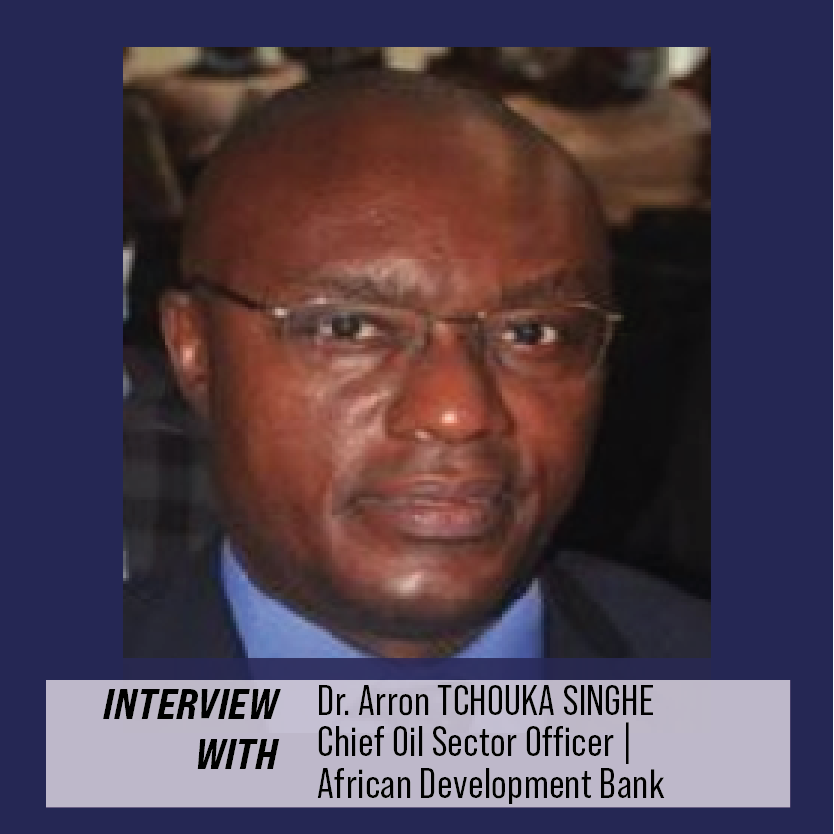
Dr. Arron TCHOUKA SINGHE
Dr. Arron TCHOUKA SINGHE | Chief Oil Sector Officer | African Development Bank
In your view how can stakeholders ensure the issue of energy transition and Paris agreement is aligned for the benefit of African countries?
Ensuring a just transition will require putting people at the center of the transition process. It is necessary for the stakeholders to take into consideration the development needs of RMCs – letting RMCs write their own story on transition in line with their needs for energy access, affordability, and energy security as well as their resource endowments; geopolitical influence; and the wider benefits to their economies through local content, value chain domestication and intersectoral linkages.
As I often emphasize in other fora, although the word “transition” describes the global pathways to net–zero carbon emissions, it may misrepresent such pathways for African countries, since most of them are already in a situation of near net–zero, net–zero, or even net–negative. In addition, most African countries fall under least developed countries’ category, and their populations linger in abject and multidimensional poverty, including energy poverty – notwithstanding their huge natural resources’ endowments. As such, a better representation of African countries’ situation is “low carbon development”, which highlights their needs for development and poverty eradication in an environmentally responsible manner.
This takes us to the main criteria of well–performing energy systems and the strategies to ensure such by each country. A well–performing energy system must obey the criteria of security, access, affordability, and environmental sustainability. Security is ensured by domestic resources and cost–effective imports strategies. The right policies and adequate investments are essential for energy access, affordability, and environmental sustainability.
Energy security is gradually shifting from solely hydrocarbons supply security to consider critical minerals and renewable energy resources. On the pathways to global transition, shocks like the COVID–19 pandemic and the Russian–Ukraine crisis are reemphasizing the trade–off that countries make amongst security, accessibility, affordability, and environmental sustainability to ensure good performance and stability of their energy systems. During the pandemic, logistical challenges favored rapid development and acceptance of renewables while the Russia–Ukraine crisis is favoring security, accessibility, and affordability at the expense of environmental sustainability. Other regions are reopening coal power plants and are committing to scale up investments in new gas developments in Africa to establish sustainable alternatives to Russia supplies, for instance. The crisis is also strengthening the influence of Africa on the global energy scene as
Europe and other regions see in Africa a trusted partner for their energy independence from Russia and a key player for balancing the global energy market.
As the Russia–Ukraine crisis revives the debate on energy security and influences the tradeoff amongst energy types for ensuring well–performing energy systems, it puts to test the key determinants of energy policies and geopolitics and expands the space within which geopolitical influences and equilibria are moving. It reinforces the position of those who advocate for enough incentives to encourage a country rich in natural gas for instance, to forego its exploitation and rely only on renewables, whereas nature–based solutions, carbon capture storage and use (CCSU) as well as bioenergy with carbon capture and storage (BECCS) can help ensuring neutrality or negativity in the process. This holds also for other resources including coal and oil.
This text represents the opinion of the author and does not reflect the views of any Development Finance Institution.




